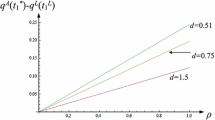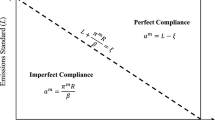Abstract
The extant literature on the political economy of environmental regulation does not provide a unified theoretical explanation for three salient stylized facts. First, companies voluntarily invest to reduce the environmental burden that they cause under threat of regulation. Second, ex ante estimates of the compliance cost tend to be systematically higher than ex post estimates. Finally, regulators use limited information provided by the industry. I construct a game-theoretic model of environmental regulation under uncertainty with a benevolent regulator. In equilibrium, companies undertake voluntary action to induce regulation that raises barriers to entry. This profit-driven behavior is not always socially detrimental, however, as the regulator obtains a credible commitment to production and a more accurate estimate of the compliance cost. Additionally, the results provide a selection explanation for the mismatch between ex ante and ex post cost estimates: if companies condition compliance on the installation cost, only low-cost companies install in equilibrium. The analysis combines “regulatory capture” with social welfare maximization to explain the curious combination of voluntary action and low ex post compliance cost without serious information collection by the regulator.
Similar content being viewed by others
References
Acemoglu D, Verdier T (1998) Property rights, corruption and the allocation of talent: a general equilibrium approach. Econ J 108(450): 1381–1403
Anton WRQ, Deltas G, Khanna M (2004) Incentives for environmental self-regulation and implications for environmental performance. J Environ Econ Manage 48(1): 632–654
Arora S, Cason TN (1995) An experiment in voluntary environmental regulation: participation in EPA’s 33/50 program. J Environ Econ Manage 28(3): 271–286
Bailey PD, Haq G, Gouldson A (2002) Mind the gap! Comparing ex ante and ex post assessments of the costs of complying with environmental regulation. Eur Environ 12(5): 245–256
Banerjee AV (1997) A theory of misgovernance. Q J Econ 112(4): 1289–1332
Benedick RE (1998) Ozone diplomacy: new directions in safeguarding the planet. Harvard University Press, Cambridge
Dean TJ, Brown RL (1995) Pollution regulation as a barrier to new firm entry: initial evidence and implications for future research. Acad Manage J 38(1): 288–303
Dean TJ, Brown RL, Stango V (2000) Environmental regulation as a barrier to the formation of small manufacturing establishments. J Environ Econ Manage 40(1): 56–75
DeGroot MH (1970) Optimal statistical decisions. McGraw-Hill, New York
Denicolò V (2008) A signaling model of environmental overcompliance. J Economic Behav Organ 68(1): 293–303
Dimitrov RS (2006) Science and international environmental policy: regimes and nonregimes in global governance. Rowman & Littlefield, New York
Ellerman AD, Buchner BK (2007) The European Union emissions trading scheme: origins, allocation, and early results. Rev Environ Econ Policy 1(1): 66–87
Epstein D, O’Halloran S (1999) Delegating powers: a transaction cost politics approach to policy making under separate powers. Cambridge University Press, New York
Fudenberg D, Tirole J (1991) Game theory. MIT Press, Cambridge
Gunningham N, Rees J (1997) Industry self-regulation: an institutional perspective. Law Policy 19(4): 363–414
Hammitt JK (2000) Are the costs of proposed environmental regulations overestimated? Evidence from the CFC phaseout. Environ Resour Econ 16(3): 281–301
Haq G, Bailey PD, Chadwick MJ, Forrester J, Kuylenstierna J, Leach G, Villagrasa D, Fergusson M, Skinner I, Oberthur S (2001) Determining the cost to industry of environmental regulation. Eur Environ 11(1): 125–139
Harrington W, Morgenstern RD, Nelson P (2000) On the accuracy of regulatory cost estimates. J Policy Anal Manage 19(2): 297–322
Henriques I, Sadorsky P (1996) The determinants of an environmentally responsive firm: an empirical approach. J Environ Econ Manage 30(3): 381–395
Khanna M (2001) Non-mandatory approaches to environmental protection. J Econ Surv 15(3): 291–324
Kwerel E (1977) To tell the truth: imperfect information and optimal pollution control. Rev Econ Stud 44(3): 595–601
Lutz S, Lyon TP, Maxwell JW (2000) Quality leadership when regulatory standards are forthcoming. J Ind Econ 48(3): 331–348
Maloney MT, McCormick RE (1982) A positive theory of environmental quality regulation. J Law Econ 25(1): 99–123
Maxwell JW, Lyon TP, Hackett SC (2000) Self-regulation and social welfare: the political economy of corporate environmentalism. J Law Econ 43(2): 583–618
McCubbins MD, Schwartz T (1984) Congressional oversight overlooked: police patrols versus fire alarms. Am J Polit Sci 28(1): 165–179
Milgrom P, Shannon C (1994) Monotone comparative statics. Econometrica 62(1): 157–180
Myerson RB (1979) Incentive compatibility and the bargaining problem. Econometrica 47: 61–74
Newell RG, Jaffe AB, Stavins RN (1999) The induced innovation hypothesis and energy-saving technological change. Q J Econ 114(3): 941–975
Peltzman S (1976) Toward a more general theory of regulation. J Law Econ 19(2): 211–240
Porter ME, van der Linde C (1995) Green and competitive: ending the stalemate. Harvard Bus Rev 73: 120–134
Prakash A, Potoski M (2006) The voluntary environmentalists: Green Clubs, ISO 14001, and voluntary environmental regulations. Cambridge University Press, New York
Pulver S (2007) Making sense of corporate environmentalism: an environmental contestation approach to analyzing the causes and consequences of the climate change policy split in the oil industry. Organ Environ 20(1): 44–83
Salop SC, Scheffman DT (1983) Raising rivals’ costs. Am Econ Rev 73(2): 267–271
Salop SC, Scheffman DT (1987) Cost-raising strategies. J Ind Econ 36(1): 19–34
Sibley DS, Weisman DL (1998) Raising rivals’ costs: the entry of an upstream monopolist into downstream markets. Inf Econ Policy 10(4): 451–470
Stigler GJ (1971) The theory of economic regulation. Bell J Econ Manage Sci 2: 3–21
Tsebelis G (2002) Veto players: how political institutions work. Princeton University Press, Princeton
Walley N, Whitehead B (1994) It’s not easy being green. Harvard Bus Rev 72(3): 46–52
Author information
Authors and Affiliations
Corresponding author
Additional information
I presented this research at an internal seminar in the Department of Economics at the University of Michigan. I am grateful to Vincenzo Denicolò, Tom Lyon, John Maxwell, the anonymous reviewers, and the editors of Resource and Environmental Economics for advice.
Rights and permissions
About this article
Cite this article
Urpelainen, J. Frontrunners and Laggards: The Strategy of Environmental Regulation under Uncertainty. Environ Resource Econ 50, 325–346 (2011). https://doi.org/10.1007/s10640-011-9473-y
Accepted:
Published:
Issue Date:
DOI: https://doi.org/10.1007/s10640-011-9473-y




